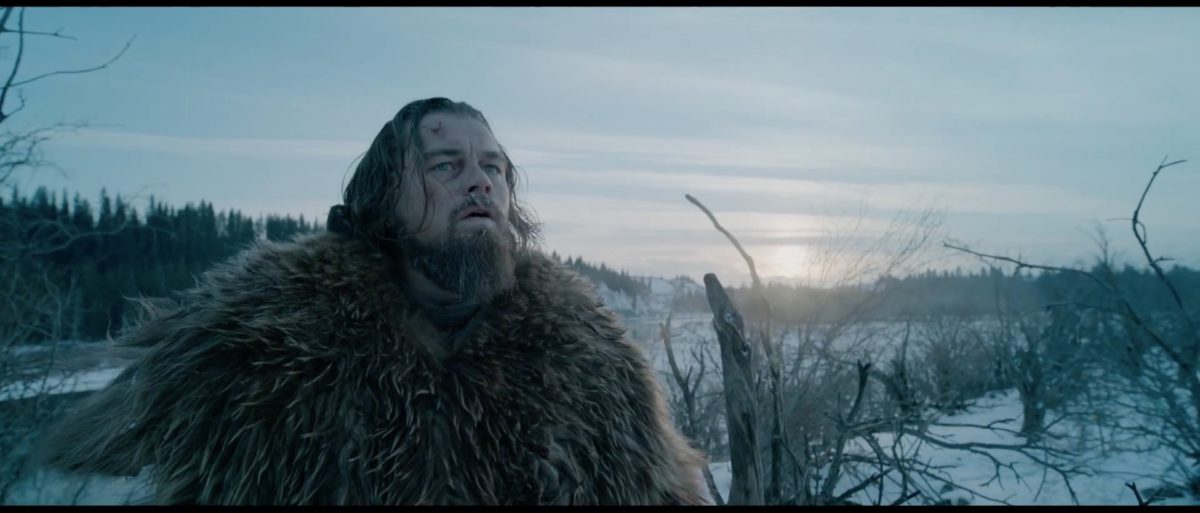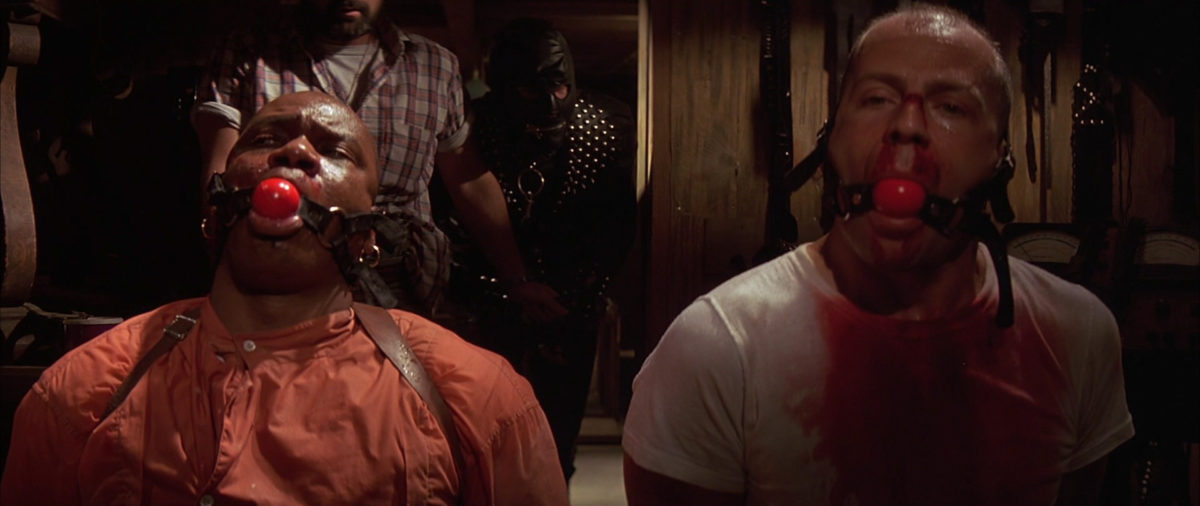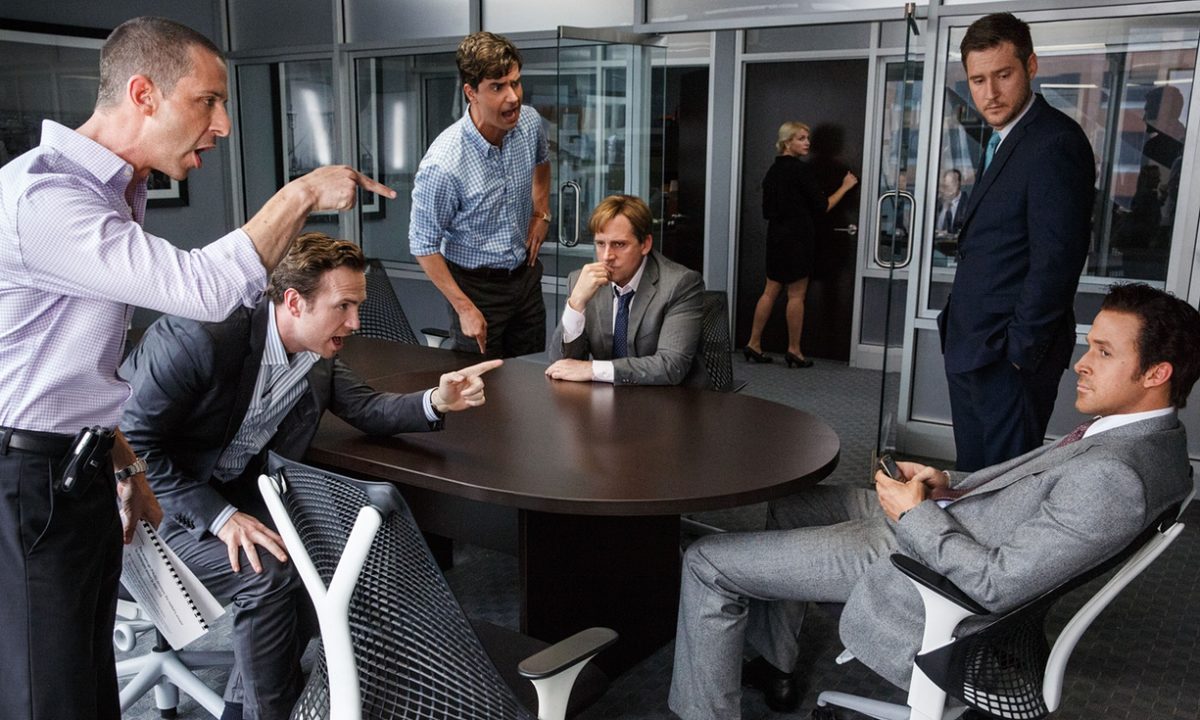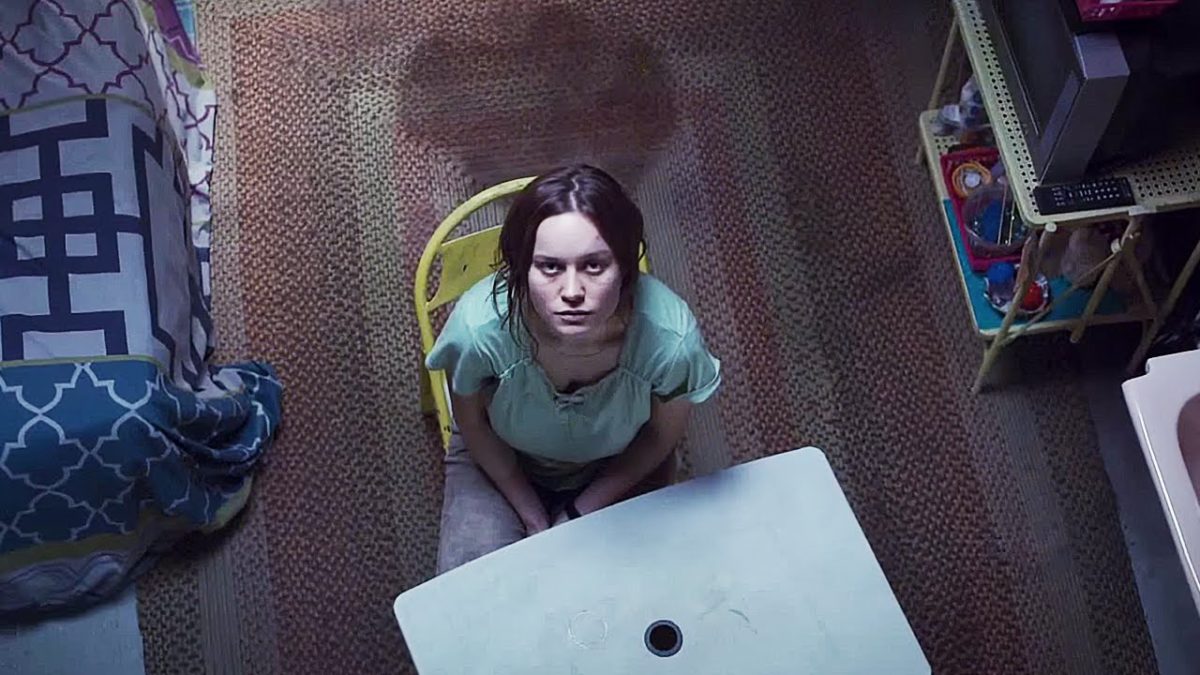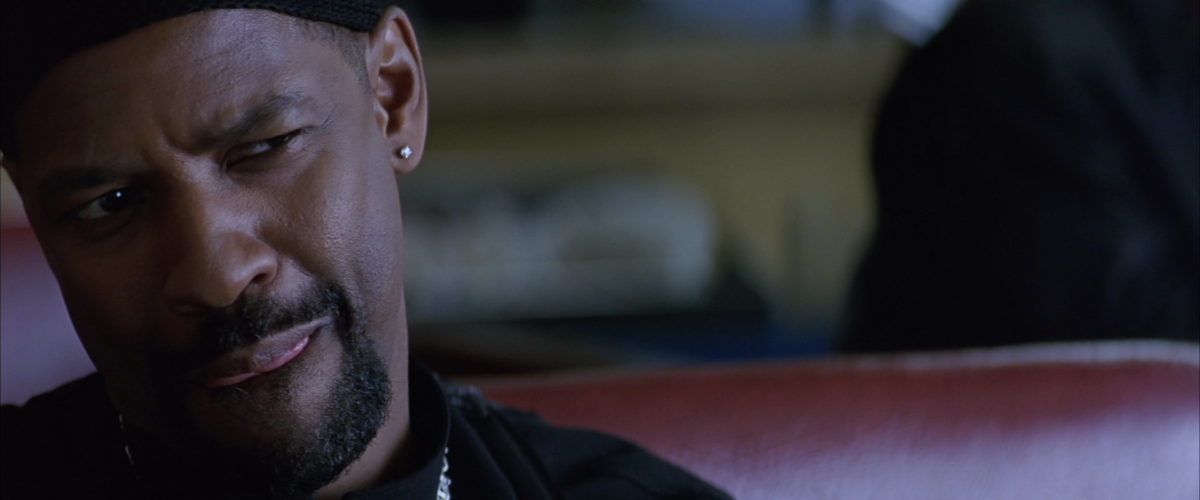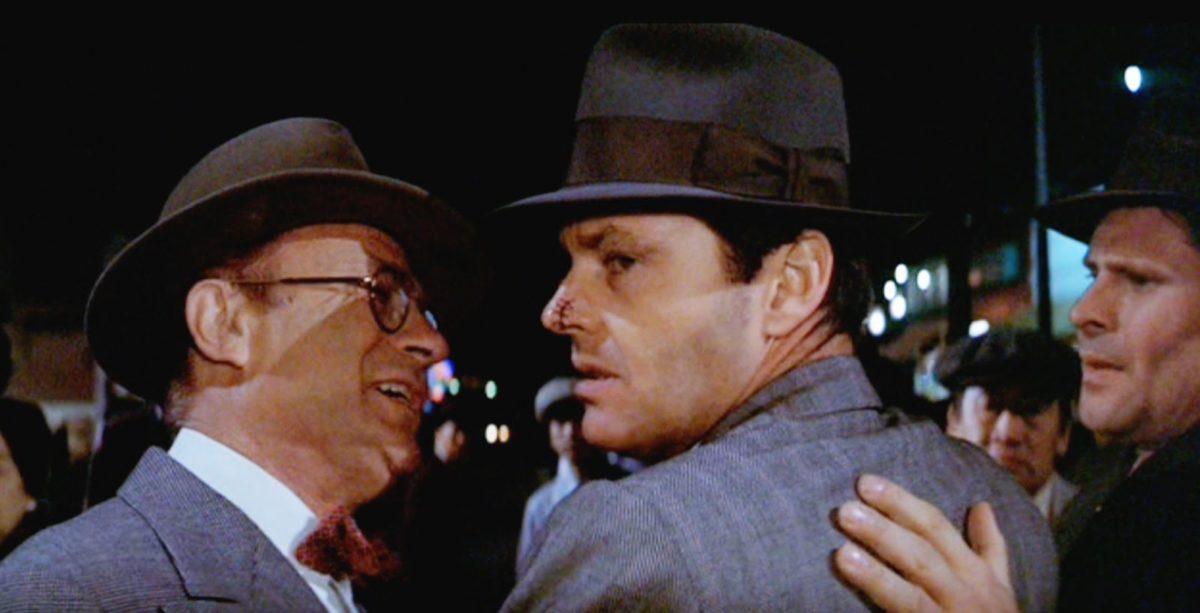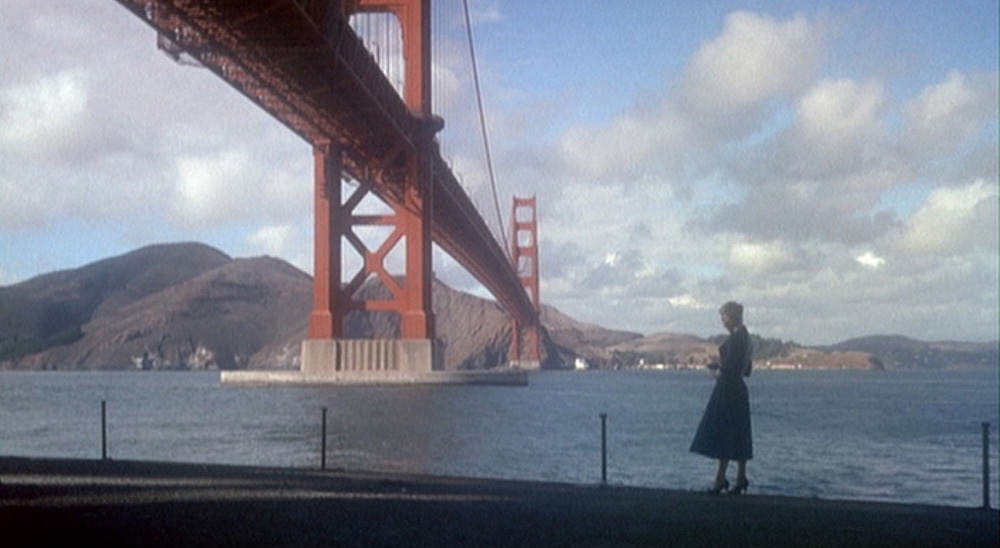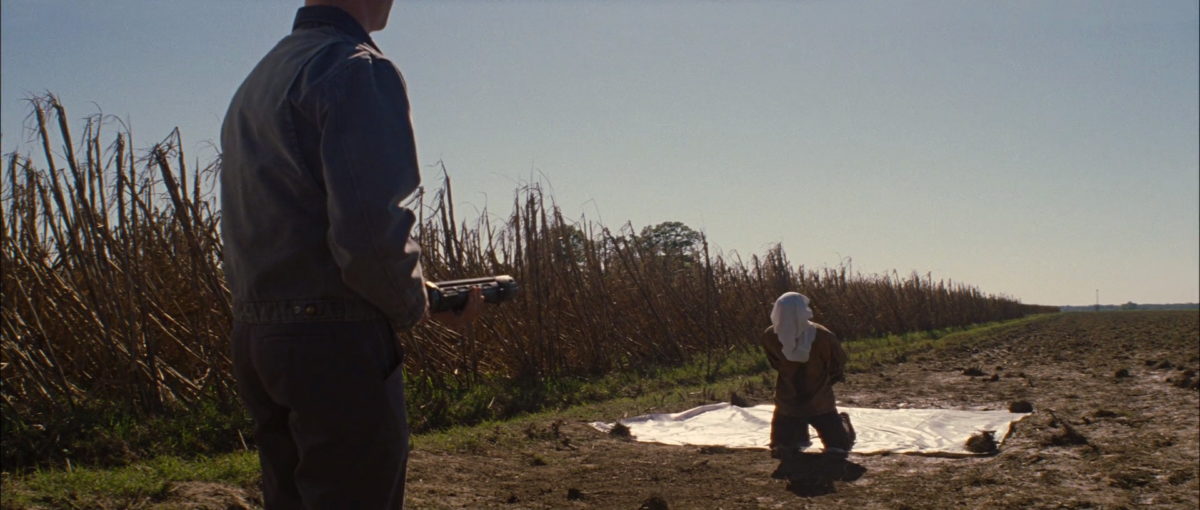Category Archives: Crime
Pulp Fiction (1994)
Ebert – Great Movies Review 2001
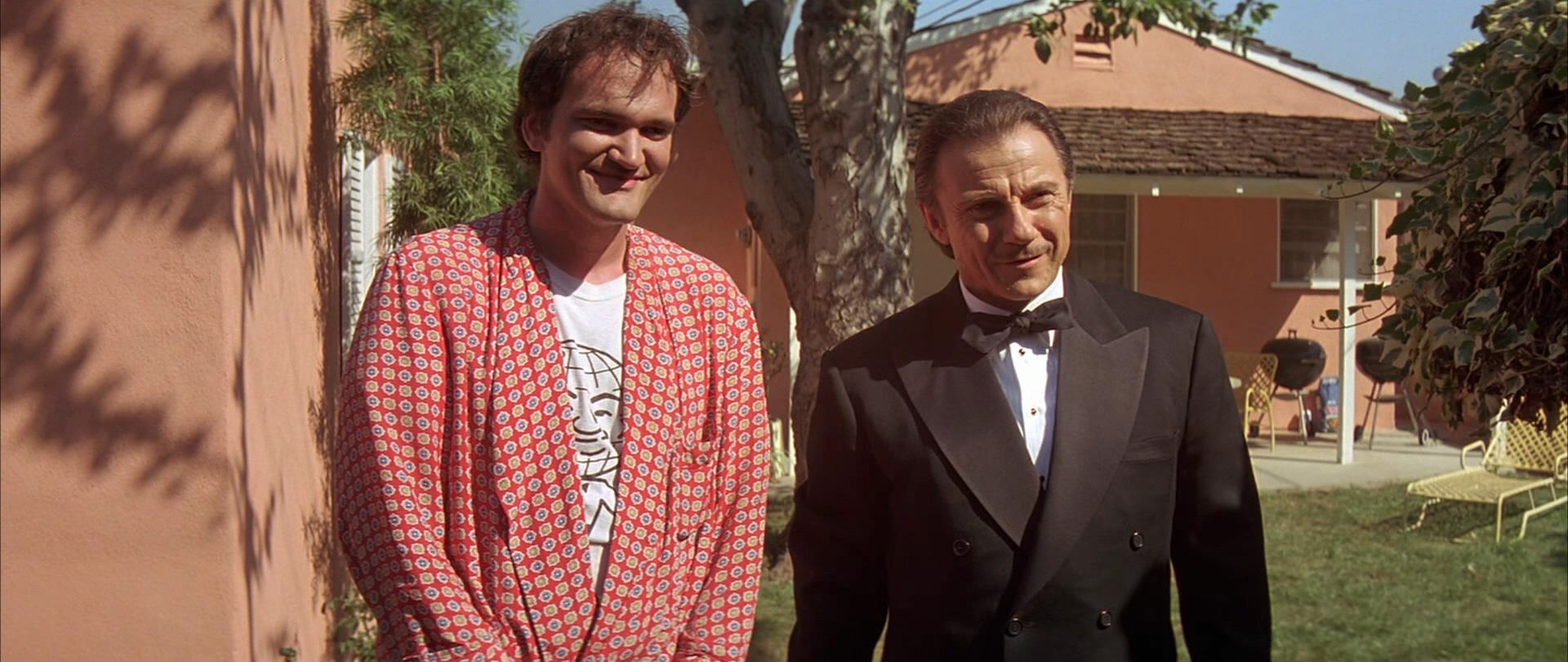
Continuing on the idea of watching the best movies that you can find on Netflix, I come to Pulp Fiction. Of course, Pulp Fiction is the film that simultaneously shot Quentin Tarantino into elite directorial status and cemented his place as one of the most innovative auteurs of all time.
His screenplay is divided into three stories, each introduced with a title card. First, there’s the story of the hit man who has to take his boss’s wife out for the evening while her husband is away. There’s the story of the aging boxer paid to throw a fight and the quest to retrieve a uniquely special family heirloom. Finally, there’s two hit men in a messy situation that needs a quick solution. These three separate stories are intertwined and not told linearly. Each story could easily stand on its own as a short film, but told as they are, each adds a further dimension to the others. The non-linear progression is not simply a gimmick, but rather an essential aspect of the film’s narrative. Continue reading Pulp Fiction (1994)
The Big Short (2015)
When I think of the collapse of the housing market and the beginning of the Great Recession, I don’t immediately think of a comedy. Millions of hard working Americans losing their homes and pensions and having to bear the burden of a government sponsored bailout makes me think of a hard-hitting and moving drama. Well, The Big Short is both of those. It is more than a comedy, but it is also tremendously entertaining even while it made me really mad and sad.
Adam McKay took the directorial chair in this adaptation of Michael Lewis’ book. McKay has previously been known for a number of Will Ferrell comedies like Anchorman, The Other Guys and Step Brothers which kind of explains the tone of the film. Lewis has been responsible for writing a number of books that have made it to the big screen despite their traditionally dry subject matter, think Moneyball (another Brad Pitt Project) and to a lesser extent The Blind Side.
 The Big Short is set in the years leading up to the financial meltdown of 2008 and tells the story of a handful of investors who saw it coming. Bitter humor (primarily delivered by an excellent narrator in Ryan Gosling) guides us through an educational journey that ultimately ends in tragedy (for everyone but our protagonists). The housing market is usually a rock-solid investment. But these guys read the signs and started suspecting that it was a skyscraper built on sand and it was getting ready to collapse. The “experts” of the day told them that it was impossible, That it couldn’t happen.
The Big Short is set in the years leading up to the financial meltdown of 2008 and tells the story of a handful of investors who saw it coming. Bitter humor (primarily delivered by an excellent narrator in Ryan Gosling) guides us through an educational journey that ultimately ends in tragedy (for everyone but our protagonists). The housing market is usually a rock-solid investment. But these guys read the signs and started suspecting that it was a skyscraper built on sand and it was getting ready to collapse. The “experts” of the day told them that it was impossible, That it couldn’t happen.
What was their argument? Because it never has. But they had no clue how blinded they had become by their own greed and self-interest. They continued giving loans to people, no matter if they’re qualified. And not just any loans but sub-prime adjustable rate mortgage loans. In some ways, it’s a horror story: We were all affected by the illegal and fraudulent activity that led to this downfall, and most of the culprits received no punishment (in fact many used the bailout money to give themselves substantial bonuses).
The most difficult subjects can be explained to the most slow witted man if he has not formed any idea of them already; but the simplest thing cannot be made clear to the most intelligent man if he is firmly persuaded that he knows already, without a shadow of doubt, what is laid before him. – Leo Tolstoy, 1897
Despite its ominous and (let’s be honest) boring subject matter. The film is so entertaining, I had to go back and see it a second time. It sports a star-studded cast (Brad Pitt, Steve Carell, Ryan Gosling, and Christian Bale) effortlessly operating at the top of their game. McKay uses a multitude of techniques to tell the story. There are plenty of fourth-wall breaking moments and monologues, my favorite being Anthony Bourdain using a cooking metaphor to explain the disgusting product that is a Collateralized Debt Obligation.  There are jump cuts, slow motion, foreshadowing and flash backs. The filmmakers use any and all tricks to explain a complicated mess of financial underhandedness in order to help the audience understand, because as our narrator tells us, “Mortgage backed securities, subprime loans, tranches… Pretty confusing right? Does it make you feel bored? Or stupid? Well, it’s supposed to. Wall Street loves to use confusing terms to make you think only they can do what they do. Or even better, for you to leave them the f*** alone.” The banks, mortgage brokers, the credit ratings agencies and the government manipulated people in the nation and world into investing in worthless packages of bonds, and it behooves the director and writer, Adam McKay, to use all cinematic tricks to explain and untangle the financial corruption. The miracle is that the film deciphers the economic melt-down well while entertaining its audience.
There are jump cuts, slow motion, foreshadowing and flash backs. The filmmakers use any and all tricks to explain a complicated mess of financial underhandedness in order to help the audience understand, because as our narrator tells us, “Mortgage backed securities, subprime loans, tranches… Pretty confusing right? Does it make you feel bored? Or stupid? Well, it’s supposed to. Wall Street loves to use confusing terms to make you think only they can do what they do. Or even better, for you to leave them the f*** alone.” The banks, mortgage brokers, the credit ratings agencies and the government manipulated people in the nation and world into investing in worthless packages of bonds, and it behooves the director and writer, Adam McKay, to use all cinematic tricks to explain and untangle the financial corruption. The miracle is that the film deciphers the economic melt-down well while entertaining its audience.
 It would probably be a good time to compare this film to two other recent films which addressed similar issues but in very different ways. First you have the over the top Martin Scorsese film, Wolf of Wall Street. That film became known for the number of F-bombs it dropped while attempting to make the world of investing look cool. Then there was the Oscar winning documentary by Charles Ferguson, Inside Job. It had a cool narrator in Matt Damon, but you almost needed a degree in Finance to follow along as they explained the crisis and spoke to experts. I feel like Adam McKay sought to walk a like between these too films, it is not over the top in an attempt to be cool, nor is it preachy and heavy handed. It reminds me of a heist movie in the vein of Ocean’s Eleven, the casino gets taken for all it’s worth, but in the end the house still wins.
It would probably be a good time to compare this film to two other recent films which addressed similar issues but in very different ways. First you have the over the top Martin Scorsese film, Wolf of Wall Street. That film became known for the number of F-bombs it dropped while attempting to make the world of investing look cool. Then there was the Oscar winning documentary by Charles Ferguson, Inside Job. It had a cool narrator in Matt Damon, but you almost needed a degree in Finance to follow along as they explained the crisis and spoke to experts. I feel like Adam McKay sought to walk a like between these too films, it is not over the top in an attempt to be cool, nor is it preachy and heavy handed. It reminds me of a heist movie in the vein of Ocean’s Eleven, the casino gets taken for all it’s worth, but in the end the house still wins.
 I’ll let you watch the movie for yourself to get to know the awesome characters that McKay develops for us. As a middle-class worker, I could not have less in common with these guys, but dang it if I didn’t feel myself rooting for and empathizing with them. We’ve got a socially backward fund manager who blasts death metal in his office. The two young guys who started on their own fund while they were still in college. Knowing that they are out of their league, they call in the investing giant turned reclusive doomsday-prepper. Then there’s the hedge-fund manager (and his team) with a bad attitude toward banks.
I’ll let you watch the movie for yourself to get to know the awesome characters that McKay develops for us. As a middle-class worker, I could not have less in common with these guys, but dang it if I didn’t feel myself rooting for and empathizing with them. We’ve got a socially backward fund manager who blasts death metal in his office. The two young guys who started on their own fund while they were still in college. Knowing that they are out of their league, they call in the investing giant turned reclusive doomsday-prepper. Then there’s the hedge-fund manager (and his team) with a bad attitude toward banks.
I already mentioned that our tour guide is played by Ryan Gosling, he is a subprime specialist at Deutsche Bank who is certain things will crash. He’s slicker than a used car salesman, but convincing and hilarious. It’s difficult to root for them when that means rooting against the economy and your own wallet. But McKay uses their formidable talents and personalities in such a way that makes it nearly impossible not to.
Room (2015)
After seeing Room yesterday, I am struck by its range. I expected it to be emotionally anguishing, and it was. But I did not expect to find a film so absorbing, thrilling, and redemptive. This film should be experienced by anyone who considers themselves a fan of the medium. If you are not familiar with the plot of Emma Donoghue’s bestselling book on which it is based, it is probably better that way. This is not to say that the novel isn’t fantastic, but I haven’t read it and am not reviewing it. I just believe that this is a film that should be approached with as few preconceptions as possible. I would think that the screenplay is faithful to the novel seeing that Donoghue wrote the screen adaptation and Lenny Abrahamson, best known before this film for taking the helm on last years’ Frank, directs with a deft touch and creativity. However, what ultimately sells the movie are the two central performances by Brie Larson and young Jacob Tremblay, who is one of the most unforgettable child actors you will ever see.
However, what ultimately sells the movie are the two central performances by Brie Larson and young Jacob Tremblay, who is one of the most unforgettable child actors you will ever see.
Larson, I have to confess, I have previously overlooked as superfluous, however she is stunning here in a role that requires her to be victim and rock, mouse and lioness, often at the same time. As terrific as Larson is, it’s Tremblay who emerges as the film’s true star. The adorable youngster proves to be both charming and heartbreaking as he charts Jack’s plastic transformation from innocent ignorance to the often painful struggle of experience.
Room is a film about liberation hidden inside a tale of entrapment. I don’t want to share too much, but Jack (Tremblay) lives with Ma (Larson) in Room. Notice the lack of a definite article, it is missing because Room is the only place on Earth the 5-year-old has ever known. Room, we come to learn, is nothing more than a dingy tool-shed supplied with the bare necessities (a single bed where they both sleep, a toilet, a filthy rug, and an unreachable skylight). This is where Jack and Ma go through their daily regimen of washing, exercising, reading, eating, etc. At night, Jack is sent to the wardrobe while a nearly mythical monster of a man they call Old Nick unlocks the door that keeps Room locked up tight and proceeds to make strange noises with Ma on the creaky bed.
Room, we come to learn, is nothing more than a dingy tool-shed supplied with the bare necessities (a single bed where they both sleep, a toilet, a filthy rug, and an unreachable skylight). This is where Jack and Ma go through their daily regimen of washing, exercising, reading, eating, etc. At night, Jack is sent to the wardrobe while a nearly mythical monster of a man they call Old Nick unlocks the door that keeps Room locked up tight and proceeds to make strange noises with Ma on the creaky bed.
Jack knows of no world outside of Room, and all the inanimate objects within are his friends and playmates. “Good morning, lamp”; “good morning, sink,” he cheerfully greets each object daily. As they celebrate Jack’s fifth birthday, Ma decides that he’s now old enough to learn about the world outside of Room. She tells him how she was stolen by Old Nick when she was 17 and how she used to be a little girl named Joy with parents who live in a house, but Room is the only world she has known for the past 7 years. Viewers quickly grasp what Jack cannot. He does not like being forced to accept that there are other human beings and animals in a world that is real and not some imaginary images they see on the ancient television inside Room. I don’t think it is any coincidence that Ma’s actual name is Joy because despite the tremendously dark circumstances, joy sits just below the surface.
I don’t think it is any coincidence that Ma’s actual name is Joy because despite the tremendously dark circumstances, joy sits just below the surface.
The second half of the movie introduces more characters and a whole new set of psychological dimensions. You should experience it for yourself rather than have me describe it here in inadequate terms. This second half is stronger in its emotional pull as we see a tremendous role reversal and young Tremblay steps into the spotlight even further. Room is ultimately a painful, conflicting, and gut-wrenching tale which is tremendously uncomfortable yet altogether enjoyable as we are reminded in a beautiful way the resilience and fullness of life.
Name that Movie #1
Denzel Washington – Top 5 Performances
If you are a fan of the awards scene like I am you probably saw that Denzel Washington took home the Cecil B. DeMille Award for Lifetime Achievement at the Golden Globes on Sunday. I think he is very deserving of this honor and so I have narrowed down what I consider to be his top 5 performances. In each case, the title of the film is a link to Roger Ebert’s Original review of the film.
If you missed it, you can watch a great montage of his films and his acceptance speech (warning: His speech is endearing, but he is mostly rambling because he forgot his glasses).
5. Glory (1989)
Let me know if you agree with my Top 5 in the comments below. Maybe you are a big fan of Man on Fire, John Q, Philadelphia, or The Book of Eli, or maybe you think Denzel is overrated and you don’t like him at all. That is fine, you are entitled to your opinion, but I dare you to tell him to his face.
Chinatown (1974)
Roger Ebert Original 1974 review:
Roger Ebert Great Movies Review – 2000:
Based on a script by Robert Towne, directed by Roman Polanski, and starring Jack Nicholson, 1974’s Chinatown takes place in 1930s Los Angeles. Private Investigator Jake Gittes (Jack Nicholson) is hired by a woman who claims that her name is Evelyn Mulwray. She wants Gittes to follow her husband, Hollis, and discover whether he’s having an affair. Gittes gets some pictures of Hollis with a young woman and hands them over to Evelyn. The next day, the pictures are published on the front page of the newspaper and Gittes is confronted by another woman (Faye Dunaway) who explains that she — and not the woman who hired him — is the actual Evelyn Mulwray. Gittes then learns that Hollis has turned up dead, drowned in a reservoir.
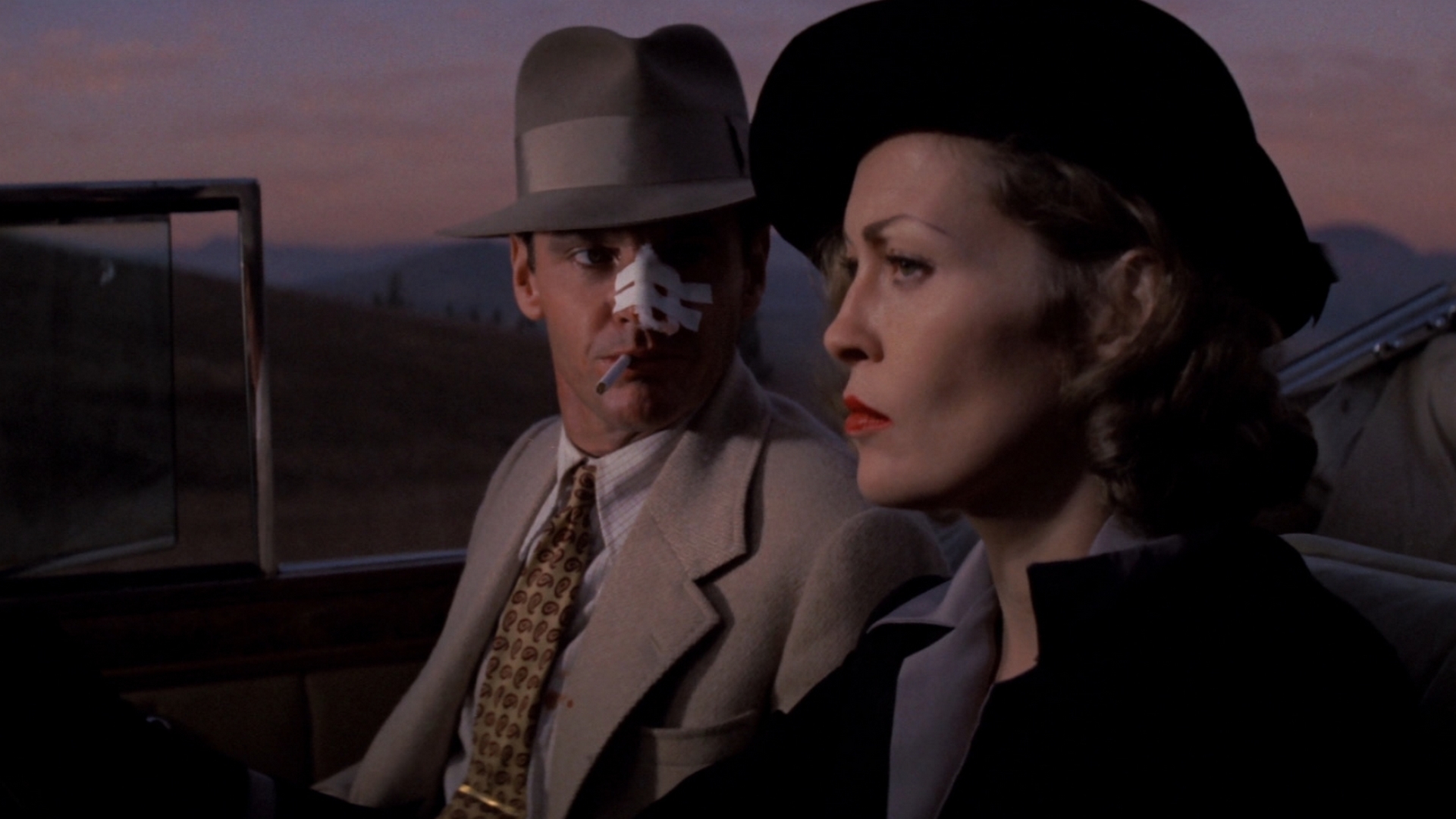 Gittes suspects that Hollis was murdered and launches his own investigation. This eventually leads Jake to Hollis’s former business partner, Noah Cross (John Huston). Noah also happens to be the father of Evelyn and he offers double Gittes’ fee if Gittes will track down Hollis’s younger girlfriend. As his investigation continues, Gittes discovers that Hollis’ murder was connected to both the continued growth of Los Angeles as a city and a truly unspeakable act that occurred several years in the past. Nobody, it turns out, is what he or she originally appears to be. I really can’t say anything more without spoiling the film for those who haven’t seen it before. Continue reading Chinatown (1974)
Gittes suspects that Hollis was murdered and launches his own investigation. This eventually leads Jake to Hollis’s former business partner, Noah Cross (John Huston). Noah also happens to be the father of Evelyn and he offers double Gittes’ fee if Gittes will track down Hollis’s younger girlfriend. As his investigation continues, Gittes discovers that Hollis’ murder was connected to both the continued growth of Los Angeles as a city and a truly unspeakable act that occurred several years in the past. Nobody, it turns out, is what he or she originally appears to be. I really can’t say anything more without spoiling the film for those who haven’t seen it before. Continue reading Chinatown (1974)
Vertigo (1958)
 Vertigo is a psychological thriller film directed by Alfred Hitchcock. The film stars Jimmy Stewart as a former police detective John “Scottie” Ferguson, who has been forced into early retirement due to his discovery of crippling acrophobia and vertigo. Scottie is hired as a private investigator to follow a woman, Madeleine Elster (Kim Novak) who is behaving peculiarly. The film received mixed reviews upon initial release, but has garnered acclaim since and is now often cited as one of the defining works of his career. It is currently listed at #65 on the IMDb Top 250, which I think is a travesty. It shows you what type of list the IMDb Top 250 is, to see this film and others, like Citizen Kane, outside of the top 50, but The Dark Knight currently holds the #4 place. But in the 2012 British Film Institute’s Sight & Sound critics’ poll, it replaced Citizen Kane as the best film of all time and has appeared repeatedly in best film polls by the American Film Institute.
Vertigo is a psychological thriller film directed by Alfred Hitchcock. The film stars Jimmy Stewart as a former police detective John “Scottie” Ferguson, who has been forced into early retirement due to his discovery of crippling acrophobia and vertigo. Scottie is hired as a private investigator to follow a woman, Madeleine Elster (Kim Novak) who is behaving peculiarly. The film received mixed reviews upon initial release, but has garnered acclaim since and is now often cited as one of the defining works of his career. It is currently listed at #65 on the IMDb Top 250, which I think is a travesty. It shows you what type of list the IMDb Top 250 is, to see this film and others, like Citizen Kane, outside of the top 50, but The Dark Knight currently holds the #4 place. But in the 2012 British Film Institute’s Sight & Sound critics’ poll, it replaced Citizen Kane as the best film of all time and has appeared repeatedly in best film polls by the American Film Institute.
I have to confess. This is one of those movies that you hear about and want to watch because others say it is so good. I’ve had it on my watch-list for years. This was one of the many Alfred Hitchcock films that my parents owned. But for some reason, unlike North by Northwest or The Birds or Psycho, I just never got around to watching this one. But I finally tackled this one on Saturday last year and have been digesting it ever since. This draft has literally been sitting in my project pile since March 2013 and if WordPress is correct in its count, I have made 67 different revisions in that time. Well, I finally watched it again tonight with the purpose of finishing what I started.
http://www.youtube.com/watch?v=b69YGZizcKc
Ebert’s Great Movies Review from 1996
*** SPOILER ALERT *** Because of the nature of this film, I must warn anyone who reads further on that the rest of this review will contain spoilers. Please take the time to watch this classic before reading any more. *** SPOILER ALERT *** Continue reading Vertigo (1958)
Looper (2012)
Director Rian Johnson began his career with the language-muddling high school film noir Brick, before moving on to the con-man film The Brothers Bloom, yet his third film, arguably his best, is a science fiction time-travel action film called Looper. Creating an original, but familiar location of near-future Earth, Johnson is able to place interesting characters with a complex time travel story line and let the audience go along for the ride.
Roger Ebert’s original review from 2012.
In the year 2044 time travel has not yet been invented, but thirty years later it will have been. Joe (Joseph Gordon-Levitt) is a Looper, a man hired to assassinate troublesome enemies of criminal gangs in 2074. These men are transported back in time with silver attached to their backs, are killed by the loopers and disposed of. 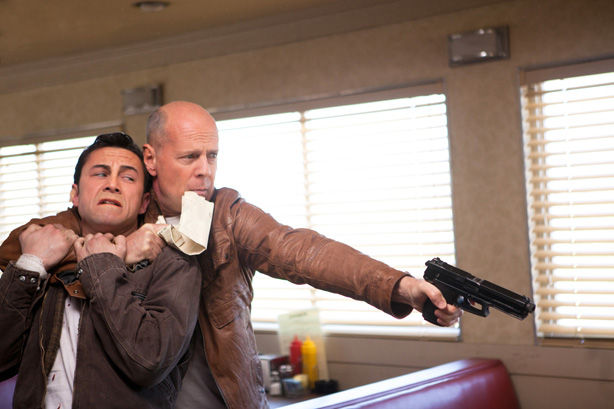 While it is a lucrative career, there is one downside, Loopers are expected to ‘close the loop’ by assassinating themselves. At this point they are given a huge payout and are effectively retired, left to enjoy the remaining 30 years of their life. When Joe’s future self (Bruce Willis) appears before young Joe, he hesitates to kill him, allowing him to escape and forces the younger self to track down the older self and kill him before the leader of the loopers, Abe (Jeff Daniels) finds him. The chase leads the two men to a remote farm, the home to Sara (Emily Blunt) and her son Cid (Pierce Gagnon), where they must finally sort out the ever-growing list of potential paradoxes.
While it is a lucrative career, there is one downside, Loopers are expected to ‘close the loop’ by assassinating themselves. At this point they are given a huge payout and are effectively retired, left to enjoy the remaining 30 years of their life. When Joe’s future self (Bruce Willis) appears before young Joe, he hesitates to kill him, allowing him to escape and forces the younger self to track down the older self and kill him before the leader of the loopers, Abe (Jeff Daniels) finds him. The chase leads the two men to a remote farm, the home to Sara (Emily Blunt) and her son Cid (Pierce Gagnon), where they must finally sort out the ever-growing list of potential paradoxes.
Looper as a science fiction film is innovative but thoughtful. There are nods to previous classics in the genre, and while many have compared it to The Matrix, it is actually more akin to The Terminator. There is time travel, a seemingly convoluted plot to assassinate and defend and a potentially unstoppable killer at its core. Yet Willis/Gordon-Levitt are a better pair than Schwarzenegger/Biehn and the plot allows for a neat summary at the end, to avoid any potential sequel issues. It’s nice for a modern film not to immediately play for a sequel with a cliffhanger ending and Johnson’s script is almost wipe-clean in its conclusion.
 The cast are uniformly excellent and Emily Blunt and Joseph Gordon-Levitt (with a prosthetic nose which is very convincing in the close-up shots) are as good as you would imagine. It is however, Bruce Willis who is the stand-out. It’s been a long time since Willis has had to show any range, and while he gets to show-off his action chops in a series of scenes that will delight fans of Die Hard, it is in the more emotional scenes that he excels. In fact after the barmy opening act, Looper is strongest when engaging in the depth of character on display.
The cast are uniformly excellent and Emily Blunt and Joseph Gordon-Levitt (with a prosthetic nose which is very convincing in the close-up shots) are as good as you would imagine. It is however, Bruce Willis who is the stand-out. It’s been a long time since Willis has had to show any range, and while he gets to show-off his action chops in a series of scenes that will delight fans of Die Hard, it is in the more emotional scenes that he excels. In fact after the barmy opening act, Looper is strongest when engaging in the depth of character on display.
Looper doesn’t just rest on engaging characters and dialogue though and the action scenes walk the line between slick and cool gun fights and visceral horror gore and violence. In an early scene when another old looper avoids execution, the methods used to bring him to ‘justice’ are horrific and more at home in a slasher horror. It is this edge-of-your-seat, adrenaline-fueled mayhem that gives Looper it’s edge and allows the character development to ground it, while simultaneously allowing the plot not to stall. It’s a masterful balancing act by Johnson and his team.
 Looper is an exciting, original-yet-familiar science fiction action film that is likely to become more and more popular with age. The term ‘Cult Classic’ is often applied to low-budget films that were passed by on their original runs, but Looper has all the hallmarks of a film that will transcend this status and become a sleeper classic. While a lot of science fiction films are all flashy effects and no soul, Looper bucks the trend and delivers something slick, but with a heart of emotion. Just don’t ask about the time travel paradoxes or you’ll be stuck in a diner for hours, making charts out of straws.
Looper is an exciting, original-yet-familiar science fiction action film that is likely to become more and more popular with age. The term ‘Cult Classic’ is often applied to low-budget films that were passed by on their original runs, but Looper has all the hallmarks of a film that will transcend this status and become a sleeper classic. While a lot of science fiction films are all flashy effects and no soul, Looper bucks the trend and delivers something slick, but with a heart of emotion. Just don’t ask about the time travel paradoxes or you’ll be stuck in a diner for hours, making charts out of straws.
Reservoir Dogs (1992)
At this point, the story of Quentin Tarantino has become fodder of the dreams of independent and amatuer filmmakers. Just over 20 years ago, Tarantino was working at a video store and all he had were his dreams. Now he is considered to be one of the most creative and visionary storytellers of our generation. His name has been listed along those of Scorsese, Kubrick, and Hitchcock. This is the film that started all of that. Before Pulp Fiction rocketed him to fame, Reservoir Dogs shocked and surprised audiences and critics alike. Empire magazine called it the greatest independent film of all time. It cost 1.2 million to make and doubled that in box office reciepts even though it was shown in less than 100 theaters. Tarantino has cited Stanley Kubrick’s The Killing as one of the major influences for Reservoir Dogs. Sadly, I have not seen this earlier gem. But I see many similarities between Kubrick and Tarantino. Tarantino, the fast-talking former video store clerk remains a major player. In fact, of his seven features, five are listed in the IMDb Top 250:
- Reservoir Dogs
- Jackie Brown
- Kill Bill
- Inglourious Basterds
- Django Unchained
So, what can I say about Reservoir Dogs that hasn’t already been said? Not much, but I can say it again. It’s a straightforward heist film that follows the genre’s basic format. A group of talented professionals band together for one big score. The attempt goes awry and the members turn on each other in the aftermath. There’s also a traitor, often an undercover cop, who places the others in jeopardy, willingly or not. In his debut film, Tarantino takes this model and infuses it with his now signature style and breathes life and chaos into the predictable formula.
First of all, Tarantino injects on the genre is his over-the-top dialogue, which has become more renowned because of Pulp Fiction, Jackie Brown, and his more recent projects. Reservoir Dogs opens with a lengthy conversation about the meaning of Madonna’s “Like a Virgin”, led by Tarantino himself as Mr. Brown. This type of pop-culture discussion from his characters would become a signature part of Tarantino’s movies going forward. Heist films aren’t generally known for their dialogue, so this was quite a dramatic change and widely expanded the audience for this movie. Characters mention Lee Marvin, Marlon Brando, the Thing from the Fantastic Four, The Lost Boys, and other enjoyable references. These guys may be involved in a daring crime, but they’re still people with other interests.
Secondly, Tarantino removes the normal focus of a heist film. The only scene we get of the heist is Mr. Pink (Steve Buscemi) fleeing from police after being ambushed. He recounts his escape to Mr. White (Harvey Keitel) after they gather at a vacant warehouse, which is the primary setting for the movie. By doing this, he deepens the film. The film really begins in the aftermath of the botched heist, and it’s jarring to leap right into the unknown situation. Mr. White is driving a getaway car while his cohort Mr. Orange (Tim Roth) writhes in the back seat and bleeds profusely from a gut shot. Most heist films introduce us to the characters and focus on their preparations for the big robbery. Tarantino does flash back to the time prior to the heist, but he’s not interested in their specific plans. Instead, he’s concerned with briefly setting up these professional thieves and their backgrounds.
Third, heist movies typically focus on criminals, there usually is a lead character (or a group of characters) that we identify with and want to succeed. A good example is Frank Ocean, who we follow from the start of Oceans 11, and while we meet others, we are tied to Frank and root for him and his team, even though he is a crook. In Reservoir Dogs, it’s not clear who we should root for because Tarantino scrambles the narrative. If the story was told chronologically, we’d likely connect with Tim Roth’s undercover cop, known by the alias Mr. Orange. In this structure, however, we don’t learn his identity and back story until more than an hour into the movie. By that point, we’ve grown to like Harvey Keitel’s Mr. White, especially because of his loyalty to his comrade. Steve Buscemi’s Mr. Pink is also interesting, though he’s a bit too manic and doesn’t tip. After we see the lengthy interlude of Orange’s preparations to infiltrate the gang, we feel sorry for the guy, but he’s not really our hero. Tarantino is taking a real chance by stopping the forward plot so late in the game. Watching Orange rehearse his made-up story is a classic segment, but it only works if we’re invested in the story. Tarantino trusts that we’re interested enough in this world to stick with him until the final shootout.
A fourth departure is the graphic violence, which keeps us on edge throughout the movie. Unlike gangster films, heist movies usually spend more time on the characters and plans of the heist and don’t include brutal killings. Tarantino actually moves some of the grisliest moments off-screen, but the overall nastiness remains. The prime example is Mr. Blond (Michael Madsen), who’s recently spent time in prison and has returned with a crazy streak. In the movie’s signature scene, he tortures a helpless cop, cuts off his ear, and prepares to burn him with gasoline. There’s no motive for this action beyond inflicting pain in the most vicious way possible. Strutting to the sweet sounds of “Stuck in the Middle with You” by Stealers Wheel, he delivers a frightening, yet cool depiction of a psychopath. This is not your everyday working-class thief.
The ending of the film is classic. It encapsulates the nihilism that we have seen throughout. We see loyalty and trust as well as betrayal and death. So, should everyone watch this film? Certainly not. If coarse language and violence is offensive to you, if you’ve seen other Tarantino films and been disgusted, then this won’t be for you. However, if you are a fan of gangster and heist movies or if you enjoy Tarantino’s style, you will like this first of his efforts. Tarantino injects his own unconventional style into the genre and delivers a powerful, energetic, and original film.
Do you agree with me? Am I way off on this one? Let me know in the comments below or on Twitter or Facebook.
